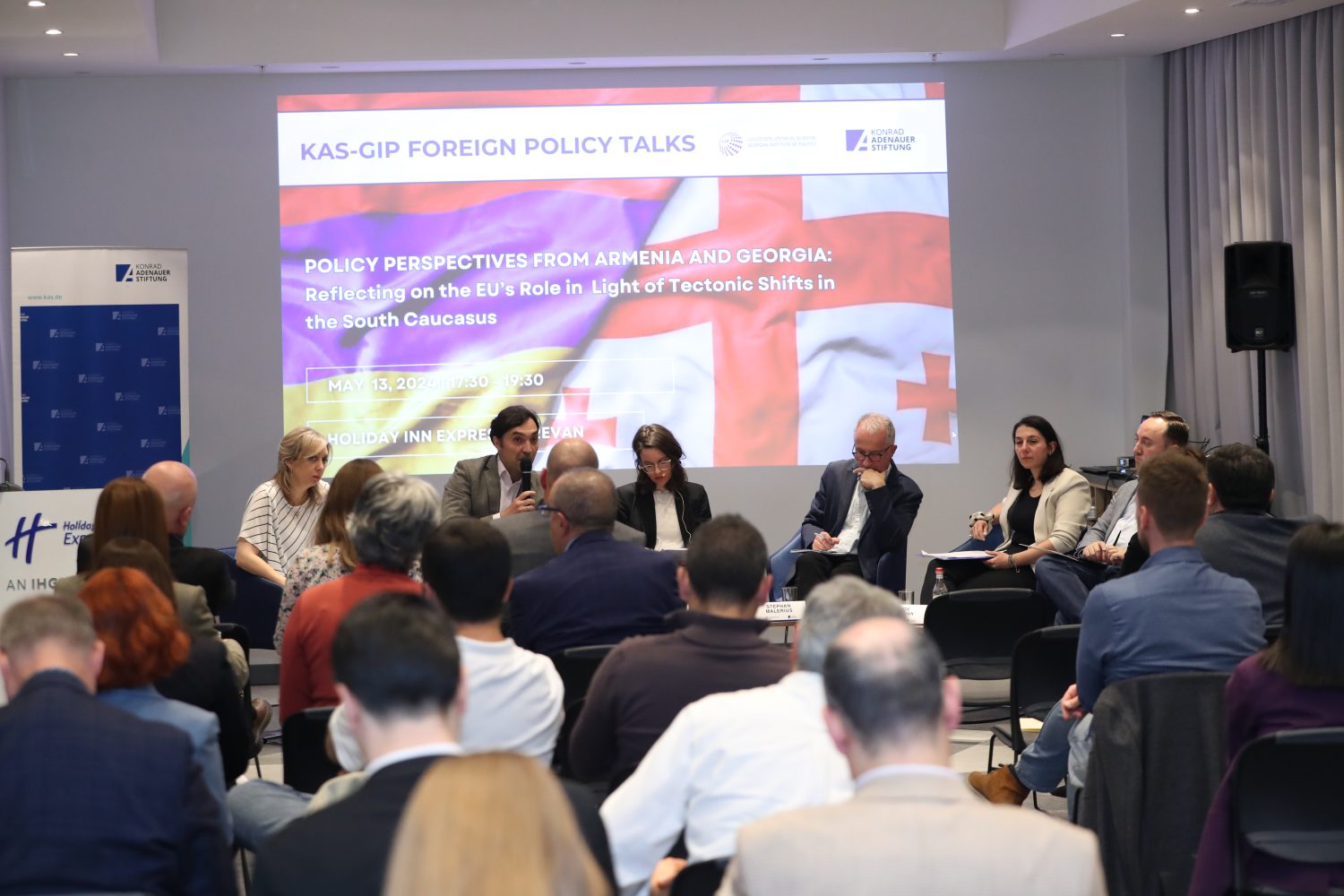KAS-GIP Foreign Policy Talks launched its South Caucasus edition with a roundtable discussion “Policy Perspectives from Armenia and Georgia: Reflecting on the EU’s Role in Light of Tectonic Shifts in the South Caucasus” held on May 13, 2024, in Yerevan, Armenia.
This session of KAS-GIP Foreign Policy Talks featured an analysis of Europeanization factors in Georgia and Armenia in the current geopolitical context. Since the second Karabakh war in 2020 and Russia’s invasion of Ukraine in 2022, the geopolitical landscape in the Caucasus has been undergoing significant shifts. This region has historically been a site of intense geopolitical competition, but the recent events have led to changes not seen since the end of the Cold War.
At the same time, the EU’s increased level of geopolitical ambition has led to a desire to challenge the dominance of regional powers in the South Caucasus such as Russia, Turkey or Iran. Brussels expanded its physical presence by deploying a monitoring mission in Armenia, and its political engagement – by granting candidate status to Georgia. Armenia welcomed this decision, as Yerevan’s disillusionment with Russia’s stance in the conflict with Azerbaijan hints at opportunities for strengthening ties with the EU and with other actors.
Still, the question remains, to what extent the Russian factor might hinder this process. Russia retains significant influence in the South Caucasus, balancing relations with other regional powers, continuing economic and military leverage in both Georgia and Armenia, various forms of hybrid threats, and significant potential to destabilize.
The EU is showing a willingness to upgrade its cooperation agenda with Georgia and Armenia and has introduced defense and security among its priorities. However, Brussels has also been criticized for the lack of strategic vision for the South Caucasus, in particular vis a vis Russia, but also Turkey and Iran. In light of these shifts and challenges, it is high time to reflect on the potential of the EU’s role in the South Caucasus and the shared agenda that could be pursued with the countries seeking closer integration, Georgia and Armenia.
To analyze Europeanization factors in Georgia and Armenia, the roundtable discussion brought together experts from Armenia, Georgia, and the EU.
The session was moderated by Stephan Malerius, Head of the Konrad-Adenauer-Stiftung in the South Caucasus. Prof. Kornely Kakachia, Director of the Georgian Institute of Politics provided introductory remarks. The keynote speaker of the event was Jan Plesinger, Deputy Head of the Delegation of the European Union to Armenia.
The discussion was based on the preliminary findings of research conducted by Dr. Franziska Smolnik, Associate, Eastern Europe, and Eurasia Research Division of the German Institute for International and Security Affairs (SWP). She delivered a presentation, “Potential of the EU’s role in the South Caucasus region: Armenia and Georgia,” which kicked off the discussion with Georgian and Armenian experts. The panel included Nino Kalandadze, Founder and Executive Director of the Chavchavadze Centre, Former Deputy Minister of Foreign Affairs, Former MP; Prof. Dr. Shalva Dzebisashvili, Head of the Political Science and International Relations Program at the University of Georgia; Anahide Pilibossian, Vice President of Strategy and Development, APRI Armenia; and Johnny Melikyan, Senior Fellow at the Orbeli Research-Analytical Center.


